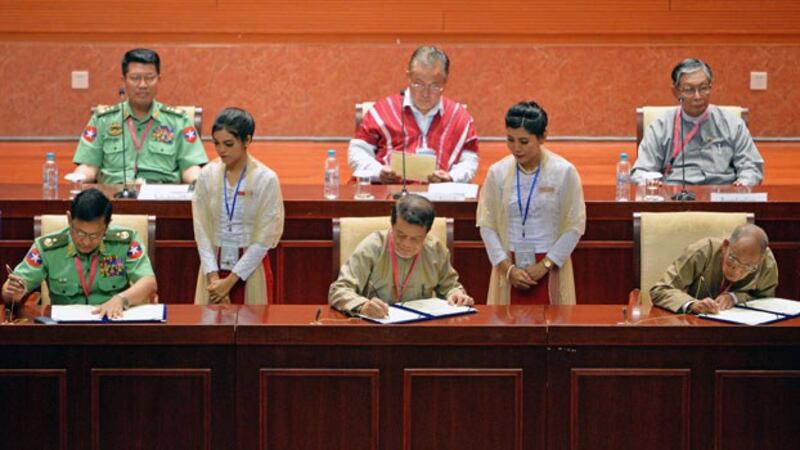Myanmar’s decision to exclude the Arakan Army, a rebel group fighting for autonomy in Rakhine state, from an invitation to ethnic armies to join national leader Aung San Suu Kyi’s signature peace talks has drawn a threat from allies of the AA to sit out the meeting unless the Arakan force takes part.
Aung San Suu Kyi won office in 2015 on a platform that included reviving a peace process to end decades of warfare between the national army and various armed ethnic groups and creating a democratic federal union in the multiethnic nation.
To forge the peace, she initiated the 21st Century Panglong Conference, named after the town where her father, Aung San, signed an agreement in 1947 on a union with leaders of some major ethnic groups — the Shan, Kachin, and Chin. The pact unraveled shortly after the country’s independence from Britain in 1948, spawning decades of warfare over still unresolved disputes over autonomy.
The modern Panglong gathering, also called the Union Peace Conference, is scheduled for Aug. 19-21 in Myanmar’s capital Naypyidaw — the last of four rounds of peace negotiations held under Aung San Suu Kyi’s ruling National League for Democracy (NLD) government before general elections in November.
Invitations to the peace conference were extended to 10 ethnic armies that have signed the government’s nationwide cease-fire agreement (NCA) since October 2015, as well as seven insurgent groups that have not signed it, said Zaw Htay, government spokesman and director-general of State Counselor Aung San Suu Kyi’s office.
“We will invite seven nonsignatories, but there are legal restrictions against inviting certain organizations, and we will not be able to invite them,” he said at a news conference Wednesday.
The Arakan Army (AA) has been fighting a 20-month-long battle against government forces in western Myanmar’s Rakhine state, where it seeks greater independence for ethnic Rakhines and wants to establish a base. The fighting has killed 274 civilians and displaced nearly 200,000 since December 2018, according to figures compiled by RFA.
In March, the government declared the AA an illegal association and terrorist organization.

Allies stick together
Two AA-allied armed groups — the Kachin Independence Army (KIA) and the Ta’ang National Liberation Army (TNLA) — said they would sit out the conference unless the government treated the AA equally.
AA spokesman Khine Thukha said Zaw Htay’s remarks show that the government is “antagonistic” towards the peace process.
“In a political sense, this ongoing fourth Panglong peace conference will be meaningful only if it is conclusive,” Khine Thukha said. “If there is bias in the inclusion of the ethnic armed groups, it will not resolve the ongoing problems.”
“It clearly shows that they do not wish to achieve a peace agreement,” he added.
The four ethnic armies comprising the Northern Alliance — the AA, TNLA, Myanmar National Democratic Alliance Army (MNDAA), also known as the Kokang Army, and the Kachin Independence Army (KIA) — have been negotiating with the government over signing the NCA but have been prevented from continuing their talks by the COVID-19 pandemic, Khine Thukha said.
Brigadier General Tar Phone Kyaw, secretary general of the Palaung State Liberation Front (PSLF) and the second-in-command of its armed wing, the TNLA, said that the AA’s allies must maintain a unified stance concerning the peace negotiations.
“We have an agreement among the alliance groups that all members must attend the peace conference or peace negotiations with the Myanmar government or the military,” he said.
“If one of the groups is not invited, it means the same for the other groups,” he said. “We have agreed on a united stance among us.”
RFA could not reach Myanmar military spokesman Brigadier General Zaw Min Tun for comment.
RFA also could not reach Colonel Naw Bu, the KIA’s spokesman, to find out if representatives from the ethnic military would attend the peace talks.
Nyi Rang, the external relations officer for the United Wa State Army (USWA), Myanmar’s most powerful ethnic armed group, said officials at the Wa group’s head office had not yet stated whether they would participate in the next session of the peace negotiations.
The USWA leads the Federal Political Negotiation and Consultative Committee (FPNCC), a body set up in 2017 to represent seven ethnic armies that have not signed the NCA.
'We won't get anywhere'
Min Zaw Oo, executive director of the Myanmar Institute for Peace and Security, said whether the three armed groups attend the peace talks is not very important.
“They have come before. They arrived and returned, and they didn’t have an impact on the results,” he said.
“We have been in negotiations for a long time. We know we won’t get anywhere with these negotiations,” he added.
Political analyst Maung Maung Soe said the exclusion of the AA from the conference closes some avenues for contact that could be useful in the overall process.
“Inviting the AA and other Northern Alliance groups won’t make any difference at the Panglong peace conference, but the presence of these armed groups would open the door for bilateral negotiations,” he said.
“If the government leaves the AA behind, at least two other armed groups will not attend, so it will push a peace deal farther away,” he added.
Besides representatives from the ethnic armed groups, delegates from the Myanmar military, the government, parliament, political parties, and civil society organizations will attend the fourth round of the peace talks.
Previous sessions were held in August 2016, May 2017, and July 2018. The third round resulted in the adoption of 51 federal-related basic principles as part of a union accord for peace.
Reported by Thiha Htun for RFA’s Myanmar Service. Translated by Ye Kaung Myint Maung. Written in English by Roseanne Gerin.

